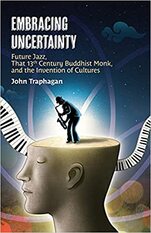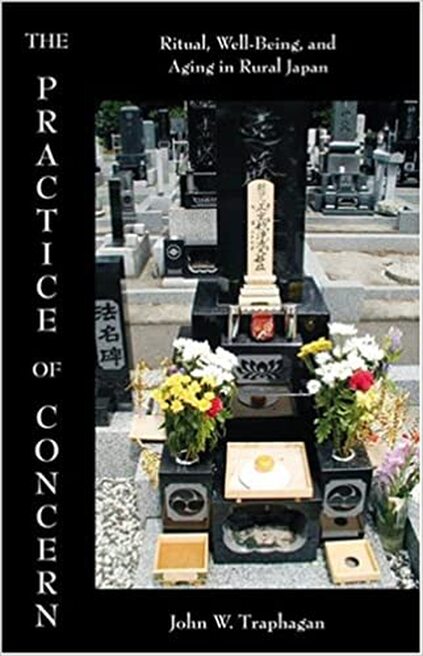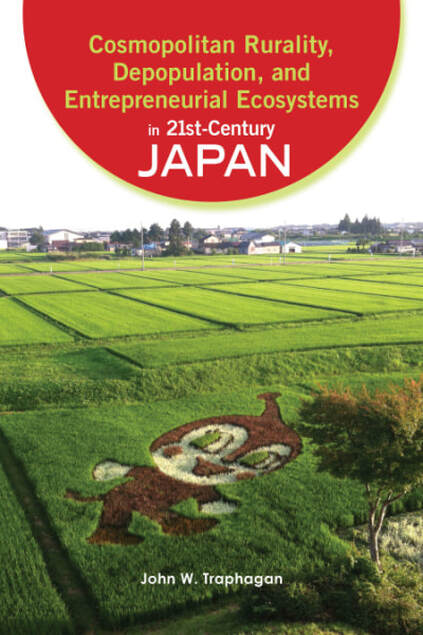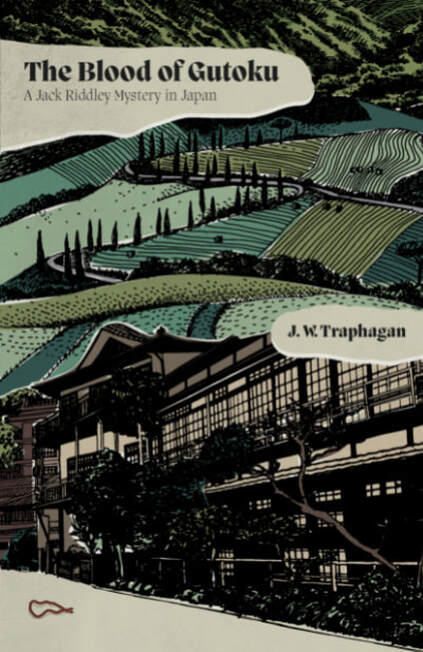J.W. Traphagan
|
John W. Traphagan, Ph. D. is Professor of Religious Studies and Anthropology and Faculty Affiliate of the Population Research Center at the University of Texas at Austin. Traphagan received in Ph.D. from the University of Pittsburg in anthropology, holds an MAR degree from Yale Divinity School, and a BA in political science from the University of Massachusetts at Lowell. His postdoctoral research was conducted as a National Institute on Aging Postdoctoral Fellow at the Population Studies Center of the University of Michigan. He was also a Fulbright scholar to Japan.
Having become bored with traditional academic writing, he has recently started using his experience as an anthropologist to write for a general audience. The first example of this is his new anthropological memoir, Embracing Uncertainty: Future Jazz, That 13th Century Buddhist Monk, and the Invention of Cultures. Later in 2021, his first ethnographic mystery novel, The Blood of Gutoku, will be published. |
Embracing Uncertainty: Future Jazz, That 13th Century Buddhist Monk,
and the Invention of Cultures
|
Non-Fiction
Here you have the product of my thinking as an anthropologist who has studied and traveled to Japan for over thirty years. In one sense, the book is an anthropological memoir in which I work through ideas of uncertainty and undifferentiation evident in the writings of Dogen as they relate to ethics and culture, but also explore other thinkers like philosopher Richard Rorty and anthropologist Clifford Geertz. I describe what I call the ethnographic outlook, which has the potential to generate humility, as a potentially powerful means to transform both self and society. A central goal of the book is to explore the idea that all knowledge is inherently uncertain, including knowledge of right and wrong, and that the quest for certainty leads to many of the problems we see in the modern world. The book threads a discussion of jazz improvisation as a way of thinking about the human experience and presents the idea of the lead sheet as a metaphor for culture and the ongoing process of change that is the world. |
The Practice of Concern: Ritual, Well-Being, and Aging in Rural Japan
|
Non-Fiction, Anthropology, Religion
The Practice of Concern: Ritual, Well-Being, and Aging in Rural Japan explores ideas and practices related to religious ritual and health among older people in northern Japan. Drawing on more than three years of ethnographic fieldwork, Traphagan considers various forms of ritual performance and contextualizes these in terms of private and public spheres of activity. An important theme of the book is that for Japanese the expression of concern about family, friends, the community, and the nation is a central symbolic element in religious ritual practice. The book has important implications for research into religion and health, because it suggests that, in order to carry out successful cross-cultural research, it is necessary to move beyond conceptualizations of religion -- largely centering on concepts of belief, faith, forgiveness -- that have shaped much of the work in this area to date, because, as consideration of the Japanese context shows, the theological language of Western religions is not necessarily adequate to the task of understanding how health and religion are tied together in other cultures. Traphagan argues that there is a need to focus on how religious rituals are markers that symbolically convey information about embodied experience and how these markers express and are expressions of concerns about health and well-being. The Practice of Concern provides a detailed examination of Japanese religious practices both within the home and in the community, as well as a thorough discussion of Japanese concepts of health, well-being, and aging. In addition to those who are interested in medical anthropology, this book will be useful to gerontologists who are concerned with cross-cultural studies in aging. Because of the rich ethnographic detail presented, the book also provides an excellent introduction to Japanese religious and ritual practice and Japanese culture and society more broadly. |
Cosmopolitan Rurality, Depopulation, and Entrepreneurial Ecosystems
in 21st-Century Japan
|
Non-Fiction, Anthropology, Business
Since the beginning of the twenty-first century, Japan has been experiencing an unprecedented decline in population that is expected to accelerate over the coming decades. Rural areas, in particular, have been at the cutting edge of this demographic transition as young people often out-migrate to urban areas to pursue education and career opportunities and to explore spaces and lifeways viewed as cosmopolitan and international. At the same time, some urbanites have decided to either return to the rural climes of their upbringing or move there for the first time to start small businesses. And rural communities have attempted to attract large projects, such as the International Linear Collider, that it is hoped will draw in new people, prevent younger people from out-migrating, and bolster local economies. A combination of individual and institutional entrepreneurial activities is changing the social and geographical landscape of rural Japan and reinventing that space as one that blends perceptions and experiences of the urban and rural, cosmopolitan and rustic. While there has been considerable research on rural Japan and numerous studies that focus on entrepreneurs, only limited attention has been paid to the intersection of entrepreneurial activities in rural Japan and the ways in which entrepreneurs more generally are contributing to the re-formation of rural space and place. This ethnographic study develops the concept of cosmopolitan rurality as a social and geographical space that cannot be characterized as either urban or rural nor as specifically cosmopolitan or rustic. In the “rural” Japan of the early twenty-first century, as in many other parts of the industrial world, we see the emergence of a new type of social context forming a hybrid space of neo-rurality that brings together people and ideas reflecting local, national, and global frames of experience. One of the key drivers behind this hybrid space is expressed in entrepreneurial activities by locals to generate an entrepreneurial ecosystem that it is hoped can attract new people and ideas while retaining ideational and geographical elements associated with traditional values and spaces. Cosmopolitan Rurality, Depopulation, and Entrepreneurial Ecosystems in 21st-Century Japan is an important book for Asian studies, rural studies, anthropology, and the study of entrepreneurialism. |
The Blood of Gutoku: A Jack Riddley Mystery in Japan
|
Fiction, Mystery, Whodunit, Ethnography
Jack Riddley is an anthropologist all too ready to retire - he is done with university politics and is eager to start his new life in a sleepy village in northern Japan. What wasn't involved in his retirement plan is for a murder to occur just as he arrives in town. With Jack's passion for ethnography, he cannot help but get involved with the investigation, eager to discover not only who committed these crimes, but why. Even a village of retirees has its secrets - abandoned traditions, family rifts, and childhood traumas - all of which are perfect motives for murder. COMING SOON - PRE-ORDER NOW
|





















